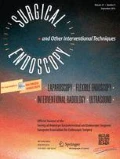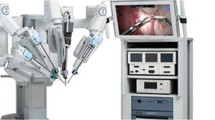Abstract
Background
The use of laparoscopic colectomy is becoming widespread and acquisition of its technique is challenging. In this study, we investigated whether supervision by a technically qualified surgeon affects the proficiency and safety of laparoscopic colectomy performed by novice surgeons.
Methods
The outcomes of 23 right colectomies and 19 high anterior resections for colon cancers performed by five novice surgeons (experience level of <10 cases) between 2014 and 2016 were assessed. A laparoscopic surgeon qualified by the Endoscopic Surgical Skill Qualification System (Japan Society for Endoscopic Surgery) participated in surgeries as the teaching assistant.
Results
In the right colectomy group, one patient (4.3%) required conversion to open surgery and postoperative morbidities occurred in two cases (8.6%). The operative time moving average gradually decreased from 216 to 150 min, and the blood loss decreased from 128 to 28 mL. In the CUSUM charts, the values for operative time decreased continuously after the 18th case, as compared to the Japanese standard. The values for blood loss also plateaued after the 18th case. In the high anterior resection group, one patient (5.2%) required conversion to open surgery and no postoperative complication occurred in any patient. The operative time moving average gradually decreased from 258 to 228 min, and the blood loss decreased from 33 to 18 mL. The CUSUM charts showed that the values of operative time plateaued after the 18th case, as compared to the Japanese standard. In the CUSUM chart for blood loss, no distinguishing peak or trend was noted.
Conclusions
Supervision by a technically qualified surgeon affects the proficiency and safety of laparoscopic colectomy performed by novice surgeons. The trainee’s learning curve in this study represents successful mentoring by the laparoscopic surgeon qualified by the Endoscopic Surgical Skill Qualification System.




Similar content being viewed by others
References
Clinical Outcomes of Surgical Therapy Study Group (2004) A comparison of laparoscopically assisted and open colectomy for colon cancer. N Engl J Med 350:2050–2059
Guillou PJ, Quirke P, Thorpe H, Walker J, Jayne DG, Smith AM, Heath RM, Brown JM, MRC CLASICC trial group (2005) Short-term endpoints of conventional versus laparoscopic-assisted surgery in patients with colorectal cancer (MRC CLASICC trial): multicentre, randomised controlled trial. Lancet 365:1718–1726
Fleshman J, Sargent DJ, Green E, Anvari M, Stryker SJ, Beart RW Jr, Hellinger M, Flanagan R Jr, Peters W, Nelson H, Clinical Outcomes of Surgical Therapy Study Group (2007) Laparoscopic colectomy for cancer is not inferior to open surgery based on 5-year data from the COST Study Group trial. Ann Surg 246:655–662
Colon Cancer Laparoscopic or Open Resection Study Group, Buunen M, Veldkamp R, Hop WC, Kuhry E, Jeekel J, Haglind E, Påhlman L, Cuesta MA, Msika S, Morino M, Lacy A, Bonjer HJ (2009) Survival after laparoscopic surgery versus open surgery for colon cancer: long-term outcome of a randomised clinical trial. Lancet Oncol 10:44–52
Kimura T, Mori T, Konishi F, Kitajima M (2010) Endoscopic surgical skill qualification system in Japan: five years of experience in the gastrointestinal field. Asian J Endosc Surg 3:66–70
Yamakawa T, Kimura T, Matsuda T, Konishi F, Bandai Y (2013) Endoscopic Surgical Skill Qualification System (ESSQS) of the Japanese Society of Endoscopic Surgery (JSES). BH Surg 3:6–8
Mori T, Kimura T, Kitajima M (2010) Skill accreditation system for laparoscopic gastroenterologic surgeons in Japan. Minim Invasive Ther Allied Technol 19:18–23
Dindo D, Demartines N, Clavien PA (2004) Classification of surgical complications: a new proposal with evaluation in a cohort of 6336 patients and results of a survey. Ann Surg 240:205–213
Yamamoto S, Inomata M, Katayama H, Mizusawa J, Etoh T, Konishi F, Sugihara K, Watanabe M, Moriya Y, Kitano S, Japan Clinical Oncology Group Colorectal Cancer Study Group (2014) Short-term surgical outcomes from a randomized controlled trial to evaluate laparoscopic and open D3 dissection for stage II/III colon cancer: Japan Clinical Oncology Group Study JCOG 0404. Ann Surg 260:23–30
Mackenzie H, Markar SR, Askari A, Ni M, Faiz O, Hanna GB (2016) National proficiency-gain curves for minimally invasive gastrointestinal cancer surgery. Br J Surg 103:88–96
Chen W, Sailhamer E, Berger DL, Rattner DW (2007) Operative time is a poor surrogate for the learning curve in laparoscopic colorectal surgery. Surg Endosc 21:238–243
Ogiso S, Yamaguchi T, Hata H, Kuroyanagi H, Sakai Y (2010) Introduction of laparoscopic low anterior resection for rectal cancer early during residency: a single institutional study on short-term outcomes. Surg Endosc 24:2822–2829
Pastor C, Cienfuegos JA, Baixauli J, Arredondo J, Sola JJ, Beorlegui C, Hernandez-Lizoain JL (2013) Surgical training on rectal cancer surgery: do supervised senior residents differ from consultants in outcomes? Int J Colorectal Dis 28:671–677
Nijhof HW, Silvis R, Vuylsteke RC, Oosterling SJ, Rijna H, Stockmann HB (2016) Training residents in laparoscopic colorectal surgery: is supervised surgery safe? Surg Endosc 31:2602–2606. doi:10.1007/s00464-016-5268-0
Langhoff PK, Schultz M, Harvald T, Rosenberg J (2013) Safe laparoscopic colorectal surgery performed by trainees. J Surg Educ 70:144–148
Yoshida T, Homma S, Shibasaki S, Shimokuni T, Sakihama H, Takahashi N, Kawamura H, Taketomi A (2016) Postoperative analgesia using fentanyl plus celecoxib versus epidural anesthesia after laparoscopic colon resection. Surg Today 47:174–181. doi:10.1007/s00595-016-1356-y
Garcia B, Guzman C, Johnson C, Hellenthal NJ, Monie D, Monzon JR (2016) Trends in lymph node excision and impact of positive lymph node ratio in patients with colectomy for primary colon adenocarcinoma: population based study 1988 to 2011. Surg Oncol 25:158–163
Miskovic D, Ni M, Wyles SM, Tekkis P, Hanna GB (2012) Learning curve and case selection in laparoscopic colorectal surgery: systematic review and international multicenter analysis of 4852 cases. Dis Colon Rectum 55:1300–1310
Barrie J, Jayne DG, Wright J, Murray CJ, Collinson FJ, Pavitt SH (2014) Attaining surgical competency and its implications in surgical clinical trial design: a systematic review of the learning curve in laparoscopic and robot-assisted laparoscopic colorectal cancer surgery. Ann Surg Oncol 21:829–840
Tekkis PP, Senagore AJ, Delaney CP, Fazio VW (2005) Evaluation of the learning curve in laparoscopic colorectal surgery: comparison of right-sided and left-sided resections. Ann Surg 242:83–91
Author information
Authors and Affiliations
Contributions
This research did not receive any specific grant funding from agencies in the public, commercial, or not-for-profit sectors.
Authors’ contributions
NI, SH, and AT conceived the idea for this study and developed it in collaboration with YO, TY, HK, and YK. NI was the principal investigator and was responsible for all data collection. NI and HI performed statistical analyses. All authors participated in interpretation and analysis of the data, revised the manuscript, and read and approved the final version.
Corresponding author
Ethics declarations
Disclosures
Drs. Nobuki Ichikawa, Shigenori Homma, Tadashi Yoshida, Yosuke Ohno, Hideki Kawamura, You Kamiizumi, Hiroaki Iijima, and Akinobu Taketomi have no conflicts of interest or financial ties to disclose.
Rights and permissions
About this article
Cite this article
Ichikawa, N., Homma, S., Yoshida, T. et al. Supervision by a technically qualified surgeon affects the proficiency and safety of laparoscopic colectomy performed by novice surgeons. Surg Endosc 32, 436–442 (2018). https://doi.org/10.1007/s00464-017-5701-z
Received:
Accepted:
Published:
Issue Date:
DOI: https://doi.org/10.1007/s00464-017-5701-z




